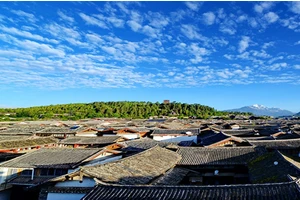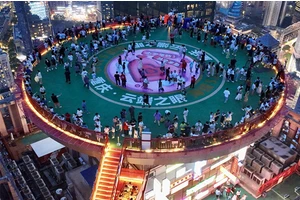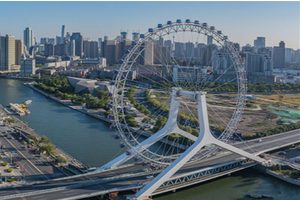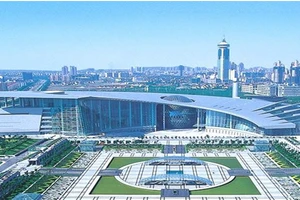Section 3.8 Tourism
Jiexiu Zhangbi Tourism (4A) Scenic Area, female tourists can enjoy free tickets on March 8;
Hongyagou (4A) scenic spot in Jinzhong, from March 8 to March 11, accompanying men enjoy a special discount of 50% off tickets (per person in 40 yuan);
Jinzhong Gypsum Mountain (4A) Scenic Area, from March 5 to March 8, all tourists are free of the first ticket (20 yuan is not free for light traffic).
Changzhi Tiantianxia (4A) Scenic Area, from March 5 to March 8, female tourists are free of scenic spot tickets, and fellow men can enjoy a 50% discount on scenic spot tickets;
Jincheng Wangmang Ridge (4A) Scenic Area, from March 5 to 8, all tourists are free of charge, and the small traffic in the scenic area (everyone in 50 yuan) needs to buy it by themselves;
Ruicheng Yongle Palace (4A) Scenic Area, on March 8th, the scenic area offered free tickets to all ladies;
Yuncheng Shentan Grand Canyon (4A) Scenic Area, on March 8th, all ladies enjoy the preferential price of tickets to 10 yuan;
Yuncheng Wanrong County Scenic Area (Wanrong West Beach, Hot Spring Bath, Houtu Temple Scenic Area and Gufeng Mountain Scenic Area), tickets are free for women and half price for men;
Yangquan Tibetan Mountain (4A) Scenic Area, the original price of 80 yuan tickets, March 5 to March 8, Ms. 3.8 yuan, Mr. 38 yuan;
Yangquan Xiaohe Ancient Village Scenic Area, on March 8 th, tourists can visit for free.
According to the explanation of the relevant departments of the Municipal Human Resources and Social Security Bureau, national festivals and anniversaries can be divided into three categories: holidays for all citizens, holidays and anniversaries for some citizens, and festivals used by ethnic minorities.
The first category is holidays for all citizens. Since 2008, there have been seven national public holidays, namely New Year's Day, Spring Festival, Qingming Festival, Dragon Boat Festival, Labor Day, Mid-Autumn Festival and National Day, with a total of 11 days.
There are three principles for the treatment of employees on national public holidays. The first is that wages should be paid during holidays. The second is that overtime pay should be paid when going to work. If workers are arranged to work on statutory holidays, they shall be paid at a rate of not less than 300% of their daily or hourly wage. Third, if it falls on a Saturday or Sunday, you should make up the leave on the working day. Holidays on national public holidays are concentrated by adjusting the weekend, and the vacation time is released by the State Council every year.
The second category is holidays and anniversaries for some citizens, including Women's Day (March 8th, with half a day off for women), Youth Day (May 4th, with half a day off for young people over 14 and under 28), Children's Day (June 1st, with one day off for children under 14) and China People's Liberation Army (August 1st, with half a day off for servicemen).
As for the half-day holiday time, it is not mandatory to specify morning or afternoon, and each unit can determine it according to the specific situation. In addition, other festivals and anniversaries, such as the Erqi Memorial Day, the May 30th Memorial Day, the July 7th Anti-Japanese War Memorial Day, the September 18th Memorial Day, the Teachers' Day, the Nurses' Day, the Journalists' Day and the Arbor Day, are not closed.
There are also three principles for the treatment of employees on holidays for some citizens.
The first is that wages should be paid during holidays. Article 51 of the Labor Law clearly stipulates that during the statutory holidays, the employer shall pay wages according to law.
The second is that you don't have to pay overtime wages when you go to work. The Letter of the General Office of the Ministry of Labor and Social Security on Wages Related to Some Citizens' Holidays stipulates: "During the holidays of some citizens, the unit shall pay wages to employees who participate in celebrations organized by the society or units and work as usual, but shall not pay overtime wages."
Third, if it falls on a Saturday or Sunday, no compensatory leave will be given. This is also clearly stipulated in the above documents.
The third category is festivals used by ethnic minorities. Festivals used by ethnic minorities shall be designated by the local people's governments in areas where ethnic minorities live in concentrated communities in accordance with the customs of all ethnic groups.
Legal basis:
1. Notice of the General Office of the State Council on Some Holiday Arrangements in 2019 (Guo Ban Fa Dian [2018] No.15) (link: webpage link)
2. Measures for Holidays of National Festival and Memorial Day (link: webpage link)
3. Link to "Letter on Some Citizens' Holidays Related to Wages": Web page link.
4. People's Republic of China (PRC) Labor Law link: Web page link.
Prev: Zhangzhou travel
Next: Jingwei global travel






